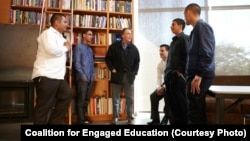Edwin Rives calls the C/Hope program, "metaphorically speaking, like a car for me to drive from hating school to having a big interest in education and knowledge."
C/Hope is one of the programs developed by Paul Cummins, a veteran educator who has dedicated his career to creating models of successful schools and programs.
Cummins said all kids deserve equal opportunity in education. In his book "Confessions of a Headmaster," he shares his journey and his vision on creating what he calls progressive learning and achieving social justice through education.
“We have excellent educational programs and independent schools in upscale neighborhoods, but in many of our inner-city schools in low-income neighborhoods, the quality of education is just not as good. ... It just doesn’t seem fair,” he said.
Progressive education
To help bring high-quality education to kids of all backgrounds, the educational visionary founded and helped set up several independent schools with a progressive curriculum.
“What I find is that the quality education is the holistic education, you’re educating the mind, body and spirit,” he said. “In our schools, we tend to measure only the five so-called solids: English, history, math, science and foreign language. But there are five other solids that are equally important.”
They are human development, outdoor/environmental education, community service, physical education and arts.
“Music, art, dance, filmmaking, theater classes - for many kids this is where their talent lies, but they never discover it because the school doesn’t have the programs. And they're the kind of things that kids are waking up in the morning looking forward to going to school for," Cummins said.
Through his nonprofit, the Coalition for Engaging Education, these five elements are translated into programs. Working with others in the private sector, these programs are offered to public schools students in after-school courses and workshops.
Education as a second chance
Cummins has also extended these programs to at-risk students including those in foster care and juvenile justice facilities, like Camp David Gonzales in California, where Edwin Rives is a C/Hope counselor.
“We try to bring the arts and fun classes where students are able to write a play and act it out in front of the camp,” he explained. “Teaching life skills is another important component of the program.”
Rives notes that most kids in detention facilities don't care about getting an education. He knows because he was once one of those kids. “By the age of 13, I was pretty much in the street all day long getting into trouble with the police, doing drugs and losing myself."
When Rives was introduced to the C/Hope program at Camp Gonzales, he started to become more serious about learning. Through free writing classes, he discovered his passion for telling stories.
“This class actually gave me a venue to express these ideas, frustrations that I was living,” he recalls. “I started up with this newspaper class. The newspaper was distributed on the camp and people read my articles. People liked my ideas and came to talk to me about it. It felt like this was an actual newspaper that I was writing for. So I felt like I’m an actual reporter.”
That’s how he started to discover that education is important and enjoyable.
Role model, inspiration
After graduating from college, Rives decided to work with the C/Hope program. To most of young men in the camp, he is a role model and an inspiration. He gives them hope that they too can turn around their lives if they pursue education.
Educator Cummins said Rives’ success proves the program is working, and that achieving social justice through education pays off.
“Look at your curriculum, if you don't have the classes that engage your students, that's one of the reasons they drop out. So if a young person who loves art or music or filmmaking or whatever has no opportunity for that and has to sit in an overcrowded class all day and at 2 o’clock or 3, when the school day is over, and there is nothing to do after school except go back to the gang infested neighborhood ... you wonder why he’s dropping out,” he said.
“But if that kid were staying at school from 2 to 6 to put on a production of ‘West Side Story’ or staying for the school orchestra or staying for an after-school environmental-ed program or robotics class - the kind of thing the kids love to do, then you’re going to save money in the long run for the society."





